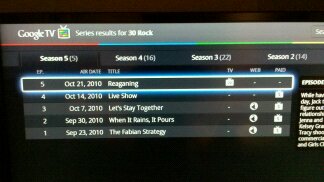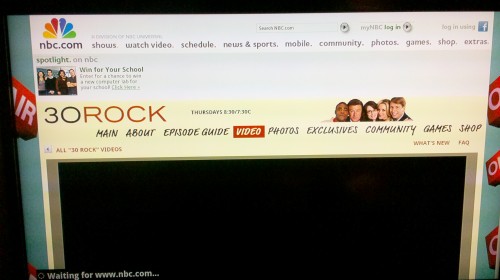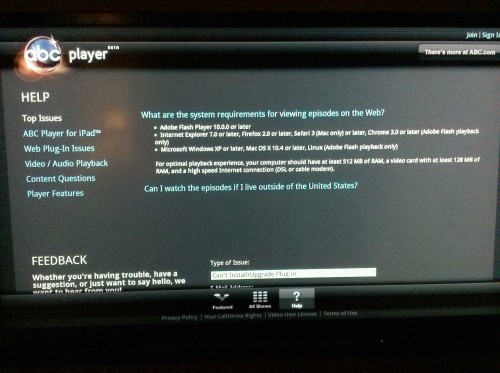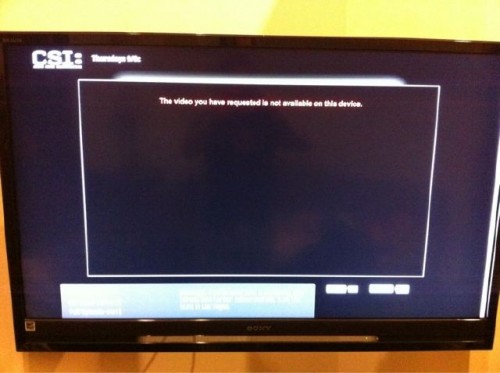A Tour Of How Networks Have Blocked Google TV From Their Web Content
After less than a week since its release, three of America’s largest television networks have started blocking Google TV users from watching video content on their web sites. Sort of. While ABC and CBS keep Google TV viewers out, as does Hulu, NBC actually still seems to let them in. Below, a visual look at […]
After less than a week since its release, three of America’s largest television networks have started blocking Google TV users from watching video content on their web sites. Sort of. While ABC and CBS keep Google TV viewers out, as does Hulu, NBC actually still seems to let them in. Below, a visual look at the blocked world of Google TV.
Google TV & Network Content
Before doing the blocking tour, I think some basics are in order. For one, none of the networks are blocking Google TV users from accessing broadcast television. You can still go to ABC, CBS and NBC directly to watch over-the-air broadcasts through Google TV just fine. Instead, what’s being blocked are some full-length episodes of TV shows that the network provide on their web sites (some short video clips are not being blocked)>
Next, it’s important to understand more about how Google TV displays video content from the web sites of major networks. The answer is easy. There’s no difference between using Google TV or your computer to reach these web sites.
Google TV isn’t stripping the video off the sites. It’s not inserting its own ads into the content. It’s not knocking down firewalls, eating small children nor sacrificing animals. It’s simply letting you use a web browser, exactly as you’d use a web browser on a Windows or Mac computer.
For example, here’s Google TV listing content for the current season of 30 Rock:
If I select a particular show, such as the first episode of the current season, I’m told places where I can view it. Below, I’m told that the first episode is available at NBC.com, as well as pay-per-view options at Amazon:
This is virtually identical to the web video listing service that’s run by Clicker, which none of the major TV networks block. If I do a search for 30 Rock at Clicker, I eventually get online viewing options for the first episode of the current season:
With either Clicker or Google TV, I’ll be taken to the web site with that content, using my computer’s browser. Here’s exactly how it looks when I arrive at NBC from Google TV:
You can go to this exact page on your own computer and compare to the screenshot above. You’ll see that they are identical.
Whether you’re on your computer or using Google TV, you’ll still see the same original ads that NBC puts in the video:
In either case, you can use the controls that NBC itself provides to make the picture fill your entire computer or TV screen:
Blocking At ABC
Yesterday evening (Wednesday, October 20 around 8pm Pacific Time), I visited all the major networks using my own Google TV system, to see what was happening.
Over at ABC.com, I was blocked immediately, as I tried to watch the current episode of Desperate Housewives:
Notice the message on the screen:
The operating system or Web browser you’re using is not currently supported. For a list of recommended operating systems and browsers, please see the help section.
Curious, I went ahead and clicked to reach that help section. There, I got this:
This page says nothing about the real reason why the video isn’t “supported,” which is that ABC wants an agreement of some sort with Google. It’s just says you need to have certain browsers, such as Chrome 3.0 or later. Google TV has that, by the way. It uses Chrome 5.0, with the necessary Flash playback.
Technically, ABC isn’t lying in that another requirement isn’t met. Google TV is running the Android operating system, and that’s not listed as a supported system. But it’s not a technical problem with Android that prevents the content from playing. It’s a licensing problem.
Blocking At CBS
At CBS.com, initially I was able to watch the current episode of CSI without issue:
However, when the first commercial break happened, the video stopped playing. I couldn’t get it to resume, so I reloaded the page. This time, I got a blocked message:
The message reads:
The video you have requested is not available on this device.
No further explanation about why is given. Similar to ABC, CBS doesn’t tell visitors to its web site what’s really going on.
Blocking At Hulu
Hulu is a company backed in part by both the parent companies of NBC and ABC, as well as Fox. Prior to Google TV’s public release this week, it was already known that Hulu would block Google TV, until some type of agreement was reached. That was certainly true when I tried to reach Hulu two days ago. I got this screen:
The message says:
We notice that you are trying to access Hulu from your Google TV. It’s not available, but we are working hard to bring our Hulu Plus subscription service to Google TV! Stay tuned for updates.
Credit to Hulu for being specific that Google TV won’t work with its service, unlike CBS and ABC which don’t get into specifics. On the downside, the $10 per month Hulu Plus service that’s mentioned isn’t even on sale to the general public yet. So don’t feel too optimistic about that message.
Blocking At NBC?
Supposedly, NBC is now blocking Google TV. If it is, the network is doing a poor job of it. I was able to reach NBC.com two days ago and view an episode of 30 Rock without any issues. Yesterday evening, after the news of the supposed blocking came out, I tried NBC again. I was able to watch two different episodes of The Office and have them play for several minutes:
I didn’t watch the entire episodes because I’ve never watched the American-version of The Office, so I didn’t want to get ahead of myself. Someday! However, I later watched two entire episodes of 30 Rock through Google TV without any problems.
Life’s Good At Fox
Surprisingly, with Rupert Mudoch having demonized Google so often over the past few years, Fox is the only major network that’s not officially blocking Google, though apparently it is considering this. Over at Fox, I was able to watch an episode of The Simpsons:
Midway through, the episode stopped, but that was due to a browser glitch with Google TV, not because of blocking. I was also able to watch an entire episode of Family Guy.
NOTE: Life has since become less good. See The Networks vs. Google: Fox Now Blocking Google TV Too
The Negotiations
Our other story, Networks To Google TV: Talk To The Hand, covers the news about how the blocking from the three major networks came to light today. The story continues to develop (watch Techmeme here for updates), with Google in talks to restore access.
Presumably, the networks want something from Google, though exactly what isn’t clear. As Google doesn’t alter their ads, they continue to benefit directly from the viewers the service sends to them, in the same way they benefit from those using computers. However, they may fear that some type of ad substitution might come, or that down the line, Gogole might place additional ads around their content. If so, they’d likely want some type of protection or a slice of any revenues generated.
The networks may also fear that if Google TV (as well as similar services such as Boxee or Roku) become popular, people might be more inclined to shift away from watching live or recorded TV — with its still lucrative advertising spots — and instead view online content where ad revenues seem generally much less. If Google’s going to enable this shift, the networks may seek some type of licensing agreement.
The Wall Street Journal also notes that the networks may seek ways for Google to better block listing unauthorized copies of their content from showing in Google and Google TV listings:
Some, including Disney and NBC, were also concerned about Google’s stance on websites that offer pirated content, according to people familiar with their thinking.
Disney executives, for example, asked that Google filter out results from pirate sites when users search for Disney content, like “Desperate Housewives.” But they were unsatisfied with Google’s response, according to people familiar with the conversations.
Ironically, Google TV is one of the best ways to prevent this. By default, the service gives preference to authorized copies of content, only providing a web search option if all else fails. It is designed to route you to official places, especially given that at those places, your viewing experience will be much better.
What If They Block Your Mac?
I’d love to talk to the networks about their views, but I don’t generally have contact with them — and when I’ve tried on the rare occasion in the past, I usually don’t hear back. Talking with Google is much easier, but I haven’t yet followed up with them in more detail about this. It’s late, and they’re pretty much only putting out a canned statement, at the moment:
We’re in the early phases of Google TV and already have strong partnerships with Best Buy, Logitech and Sony, among others. We are excited about the opportunities our new platform creates for both established media companies like Turner and HBO, and tens of thousands of content creators large and small. Google TV enables access to all the web content you already get today on your phone and PC, but it is ultimately the content owner’s choice to restrict users from accessing their content on the platform.
So, no having heard the viewpoints from other side, I’ll give you my take, for what it’s worth. I’m pretty annoyed with the networks that are blocking. Google TV is simply a computer. If the networks have a problem with people using computers to watch the content they already offer on their own web sites, then stop offering it to everyone. Targeting a particular platform is worrisome.
For example, it’s pretty easy to hook up a computer to a television these days. What if the networks next decide that they want agreements with Microsoft and Apple for their platforms, Windows and Mac OS? Say Microsoft agrees but Apple doesn’t. Could those using Apple computers find they’re blocked, just as Google TV is being blocked?
It’s possible. Google TV has practically no one using it right now, so the networks have a lot of power to hold over Google’s head without the threat of millions of angry people. Google TV is also especially vulnerable. If it can’t deliver people to online content, it loses much of its appeal. It’s unlikely they’d want to anger millions of “regular” computer users by similar blocking. But it’s possible.
In the end, it seems crazy that using a browser on a laptop is OK but using a browser through things like Google TV is not. The only difference is the size of the viewing screen, pretty much. I understand that there’s a threat of viewing habits changing, of the “big screen” of the living room becoming more computer-like, with computer-like behaviors. But hit-and-miss blocking feels like a new play on failed copy protection and other schemes in the past.
To understand more about how Google TV works, I recommend reading my tour from yesterday, Life With Google TV: My First Day Review & Impressions.
Postscript – Further blocking has happened since this was written. See:
- The Networks vs. Google: Fox Now Blocking Google TV Too
- Viacom Blocks Google TV From Airing Comedy Central, MTV, VH1, and Nickelodeon
Also see How to *Bypass* the Blocking of Google TV by Hulu and Other Networks from Lauren Weinstein on how to use PlayOn as a way around the blocking.
Contributing authors are invited to create content for Search Engine Land and are chosen for their expertise and contribution to the search community. Our contributors work under the oversight of the editorial staff and contributions are checked for quality and relevance to our readers. Search Engine Land is owned by Semrush. Contributor was not asked to make any direct or indirect mentions of Semrush. The opinions they express are their own.














